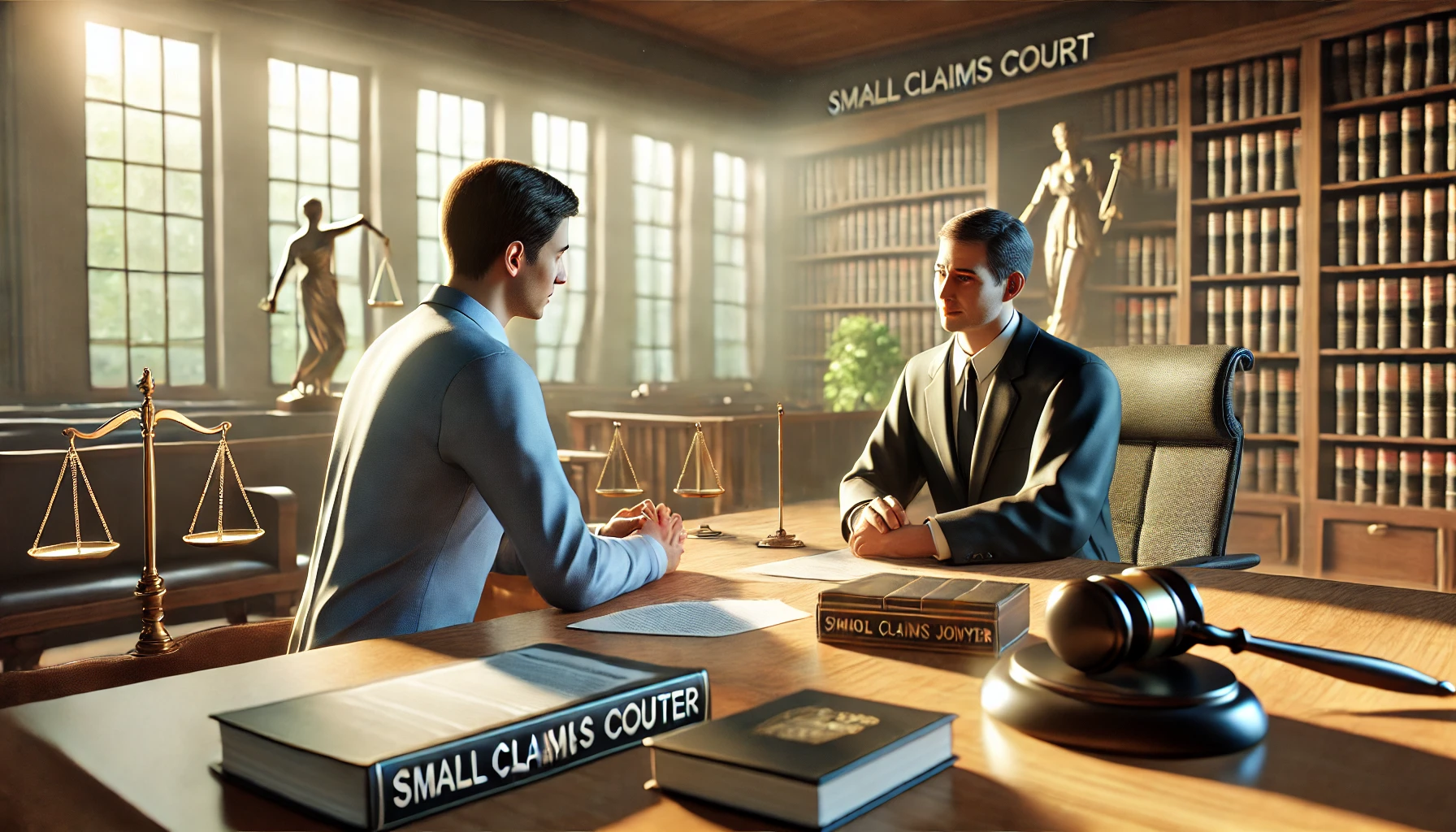Introduction:
Facing a small claims case might seem straightforward, but many quickly find that representing themselves can get complicated. Court procedures, legal paperwork, and the need to present a convincing argument are challenging for someone without legal training. A small claims court lawyer can provide the expertise needed to navigate these hurdles. Even in cases that appear simple, unexpected legal issues may arise, and having a professional on your side can make a big difference. You may ask, “Do I need a lawyer for small claims court?” While it’s not always required, having legal support can boost your chances of success and give you peace of mind. Many lawyers even offer a small claims court lawyer free consultation, allowing you to explore your options without initial costs.
1. Do You Really Need a Lawyer for Small Claims Court?
You can represent yourself in small claims court, but having a lawyer often increases your chances of winning, especially in more complex cases. While it’s possible to handle minor disputes on your own, understanding legal procedures, filing documents correctly, and presenting a strong case can be stressful. A lawyer will make sure that everything is done right the first time.
Do you need a lawyer for small claims court? It depends on your case, but many find that having a lawyer simplifies the process. Lawyers handle all the paperwork, court filings, and negotiation, which saves you time and reduces anxiety. They also know what judges expect, which helps you avoid mistakes that could cost you the case.
In states like Georgia, hiring a small claims court lawyer Georgia is beneficial because they understand the specific state laws and procedures, giving you a clear advantage.
2. The Benefits of Hiring a Lawyer for Small Claims Court
Hiring a small claims court lawyer comes with many advantages that can make a significant difference in your case. First, they handle all the paperwork, ensuring that everything is filed correctly and on time. Missing deadlines or filling out forms improperly can weaken your case, but a lawyer ensures accuracy. They also gather evidence, making sure your case is well-supported and strong. This takes the burden off your shoulders and helps build a solid argument in court.
A lawyer also reduces stress and anxiety for clients. Legal matters can be overwhelming, and a small mistake can hurt your chances of winning. By having a professional on your side, you ensure proper representation, so you don’t have to worry about missing any crucial steps.
In busy places like New York, where the court system can feel even more complicated, hiring a small claims court lawyer NYC can be particularly helpful. Many lawyers offer a small claims court lawyer free consultation, so you can discuss your case and see if legal representation is the right choice without financial pressure.
3. How Much Does a Small Claims Court Lawyer Cost?
The cost of hiring a small claims court lawyer can vary based on several factors, including the complexity of the case and your location. Typically, simpler cases with clear evidence may cost less, while more complicated disputes that require extra time and effort may be more expensive. However, many lawyers understand that small claims cases involve limited amounts of money, so they often offer affordable fees.
One important factor that affects the cost is location. For example, lawyers in large cities might charge more due to the higher cost of living. That said, many lawyers provide a small claims court lawyer free consultation, which allows you to explore your options without any financial commitment upfront. This consultation can help you understand the potential costs and decide whether hiring a lawyer is the right move for your case.
By taking advantage of free consultations and asking about fee structures, you can find a lawyer that fits your budget and get the help you need to make your case strong.
4. Do Lawyers Offer Free Consultations for Small Claims Court?
Yes, many small claims court lawyers offer free consultations. These consultations give potential clients the opportunity to discuss their case with a lawyer and determine if legal help is necessary. During this meeting, the lawyer will review the details of your situation, provide insight into the legal process, and offer guidance on whether or not you need legal representation.
A small claims court lawyer free consultation can be especially helpful if you’re unsure whether your case requires professional legal assistance. You get to understand the strengths and weaknesses of your case and decide how to move forward without any initial cost. This is a great option for those who may be on the fence about hiring a lawyer.
For example, if you’re in New York and considering whether you need a lawyer, a small claims court New York lawyer can provide a free consultation to assess the case under local laws and offer you peace of mind about your next steps.
7 Key Things You Need to Know Before Hiring a Rideshare Accident Lawyer
5. Why Location Matters: Finding the Right Lawyer
Location plays a crucial role when hiring a small claims court lawyer because local laws and court procedures can vary significantly. Each state, and sometimes even each county, has its own specific rules, deadlines, and legal nuances that must be followed. A lawyer who is familiar with the local regulations will know exactly how to handle your case, ensuring that all the right steps are taken.
For instance, if you’re in New York, hiring a small claims court lawyer NYC ensures that your lawyer knows the ins and outs of the New York court system, helping to avoid any mistakes or delays. Similarly, a small claims court Georgia lawyer will understand the unique aspects of Georgia’s small claims procedures, giving you an edge in your case.
Choosing a local lawyer means they’ll have experience with the judges, understand the common types of cases in your area, and can tailor their strategy to local legal practices. This familiarity is key to ensuring your case moves smoothly through the court system.
6. What Can You Expect from the Process?
Working with a small claims court lawyer usually begins with an initial consultation, where the lawyer listens to the details of your case and offers advice on how to proceed. During this meeting, you can ask questions, and the lawyer will help you understand whether legal representation is the best option. This is especially important if you’re unsure and asking yourself, “Do you need a lawyer for small claims court?” The consultation will help clarify things.
After you decide to hire the lawyer, they will handle the paperwork, gather any necessary evidence, and make sure everything is properly filed with the court. They also take care of communicating with the other party involved in the case, which can often be a stressful part of the process.
As the court date approaches, your lawyer will prepare your case, organizing your argument and evidence to present to the judge. On the court day, the lawyer represents you, ensuring that all legal procedures are followed and that your case is clearly and professionally communicated.
Throughout this entire process, your lawyer will manage the confusing legal aspects, which allows you to focus on other things, knowing that your case is in capable hands.
7. Choosing the Best Lawyer for Your Small Claims Case
Finding the right small claims court lawyer is essential to ensure the best outcome for your case. Here are some tips to help you select a lawyer who is both qualified and affordable:
- Look for Positive Reviews: Check online reviews and testimonials from previous clients. A lawyer with strong, positive feedback is likely to provide reliable service. Look for reviews that mention successful small claims cases specifically.
- Experience in Small Claims Cases: Not all lawyers specialize in small claims cases, so make sure the lawyer you choose has specific experience in handling cases like yours. This ensures they know the processes and strategies that work best in these cases.
- Accessible Communication: Choose a lawyer who is easy to reach and communicates clearly. You want someone who will keep you updated and explain the legal details in a way you can understand. Clear communication can reduce stress during the legal process.
- Consider Free Consultations: Many lawyers offer a small claims court lawyer free consultation, which allows you to discuss your case and determine if the lawyer is a good fit without any upfront costs. Use this opportunity to ask about their experience, fees, and approach to your case.
Conclusion:
In summary, hiring a small claims court lawyer can make a significant difference in your case. While representing yourself is an option, legal representation brings expertise, reduces stress, and improves your chances of success. A lawyer will guide you through the legal process, handle the paperwork, and present your case with professionalism, ensuring that nothing is overlooked. Whether you’re facing a complicated case or simply want peace of mind, having a lawyer on your side is a smart decision. Take advantage of free consultations to explore your options and see how a lawyer can help you navigate your case with confidence.
FAQs:
How much does it cost to file small claims in Indiana?
Filing fees for small claims court in Indiana typically range from $35 to $100, depending on the court and the amount being claimed.
What kind of damages can you sue for in small claims court in Indiana?
You can sue for various types of damages, including property damage, breach of contract, unpaid debts, and personal injury, as long as the claim amount doesn’t exceed the state’s small claims limit.
Can you get a warrant for not going to small claims court in Indiana?
While you won’t typically get a warrant for missing small claims court, failing to appear may result in a default judgment against you, meaning you automatically lose the case.
Do I need a lawyer for small claims court in Texas?
While it’s not required to have a lawyer in Texas small claims court, having legal representation can improve your chances, especially in more complex cases.
What happens if you miss Small Claims Court in Indiana?
If you miss your court date in Indiana, the judge may issue a default judgment in favor of the other party, meaning you lose the case without presenting your side.
How long do you have to pay a small claims judgment in Indiana?
Once a judgment is issued, the court may provide a specific time frame to pay, usually within 30 days. However, this may vary depending on the case and any agreements made during the judgment.
Explore the Attorney realm with The Expert Law. Visit our website for limitless inspiration!





